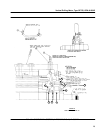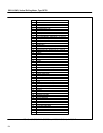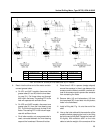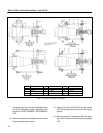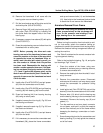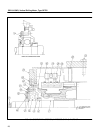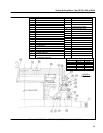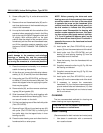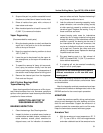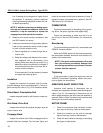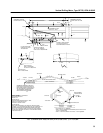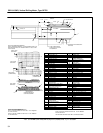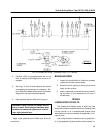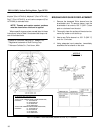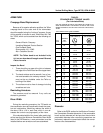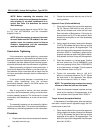
Vertical Drilling Motor, Type GE752, GEK–91584D
31
2. Suspend the part in a position accessible from all
directions to a direct flow of steam from the hose.
3. Rinse all residue from parts with a mixture of
clean steam and water.
4. Bake insulated parts for at least 8 hours at 150_
C (302_ F) to remove all moisture.
Vapor Degreasing
(Recommended for metal parts)
1. Bring the cleaning solution to a boil, and allow the
vapor line in the tank to rise to the condenser
coils at the top of the tank.
2. Keep the vaporized cleaning solution at about
120_ C (248_ F).
3. Lower the part to be cleaned into the vapor–la-
den atmosphere, so the vapor will condense on
the part.
4. To speed the removal of heavy dirt accumula-
tions, spray hot solution directly from the tank
onto the part being cleaned. The temperature of
the solution must be kept below its boiling point.
5. Remove the cleaned part from the degreaser.
Drain and cool the part.
Anti–Friction Bearings/Shaft
Tapers/Bearing Fits
Use a cleaning solution that leaves an oil film to pro-
tect finished surfaces from rust. Kerosene, petroleum
spirits or other petroleum–base cleaners provide limited
protection for these surfaces.
INSPECTION AND TEST OF
DISASSEMBLED MOTOR
BEARING INSPECTION
1. Clean the bearings. See Cleaning section.
2. Inspect for broken or cracked races, broken or
cracked rollers and balls, broken, cracked or dis-
torted retainers, scored, pitted, scratched or
chipped races, and for indication of excessive
wear on rollers and balls. Replace the bearing if
any of these conditions is found.
3. Look for evidence of smearing caused by inade-
quate lubrication, and corrosion pitting (usually
at roller spacing) caused by moisture or other
corrosive agent. Replace the bearing if any of
these conditions are found.
4. Inspect bearing outer races for indentations
caused by dirt or foreign material having gone
through the bearing. If the indentations are small
and few in quantity, the bearing can be used. If
the indentations are large and numerous, this
may be an indication the rollers or cone are start-
ing to spall out. Examine the rollers and cone
carefully for spalled areas. Replace the bearings
if spalled areas are found.
5. Dip good bearing parts in a light mineral oil
(SAE–10) heated to 90_ C (194_ F) to avoid cor-
rosion before reassembly.
6. If a bearing will not be mounted immediately,
wrap it in an oil–proof paper.
CAUTION: Do not interchange bearing parts of
different manufacture or mix new and used
bearing parts.
Perform the following inspection and tests to deter-
mine the condition of the armature, coiled motor frame
and brushholders.
After the inspection and test procedures have been
completed and all defects or damage noted, refer to the
REPAIR section for the correct repair procedure.
ARMATURE
Handle the armature carefully during overhaul oper-
ations to avoid damage to the core, banding, end turns,
shaft fits and commutator. Support the armature in a
saddle to protect the commutator and to coil the ends.
Keep the commutator covered with heavy paper.
Armature Test
1. With the armature at room temperature, 25_ C
(77_ F), use a 500 or 1000 vdc megohmmeter
and make a dielectric test of the armature insula-



